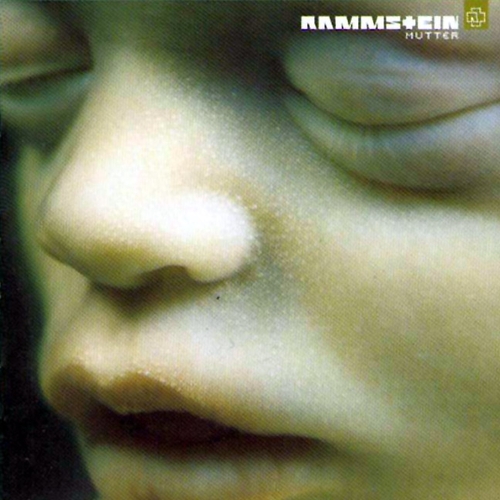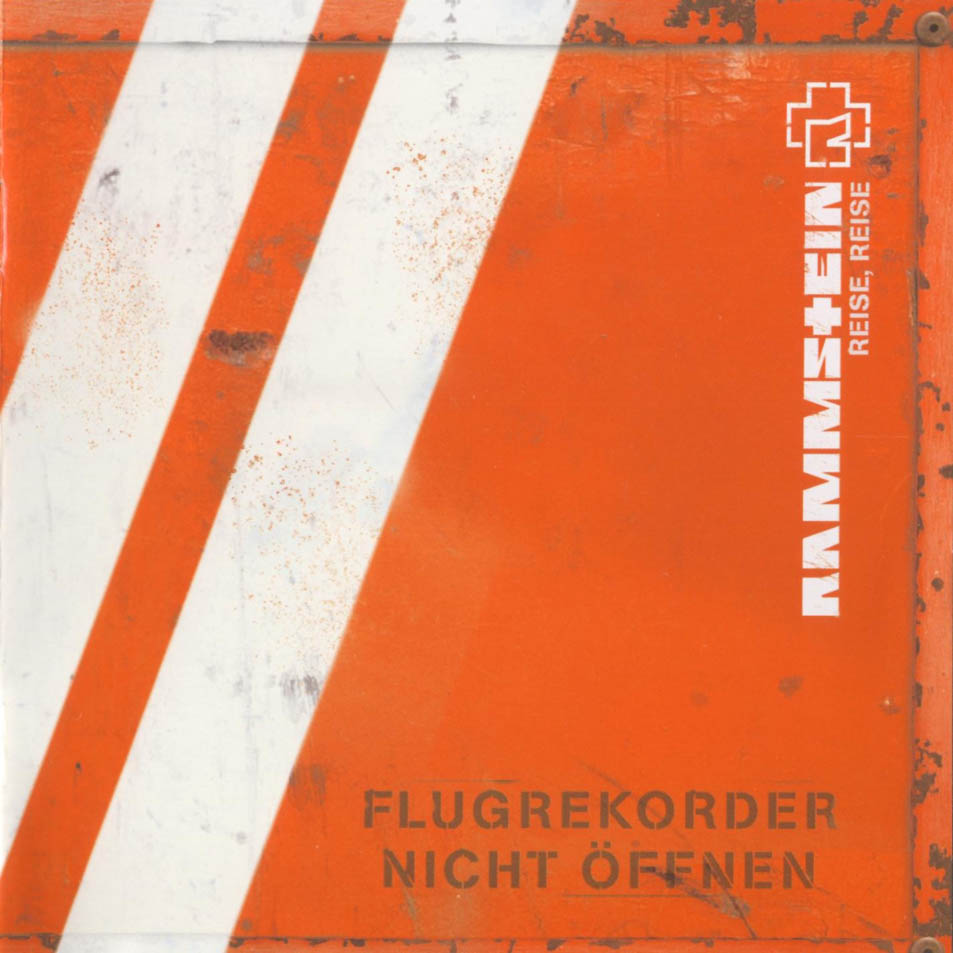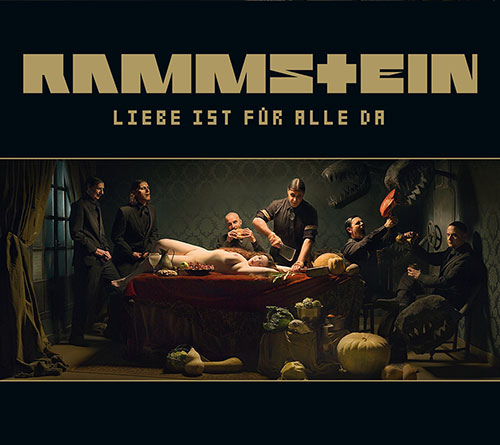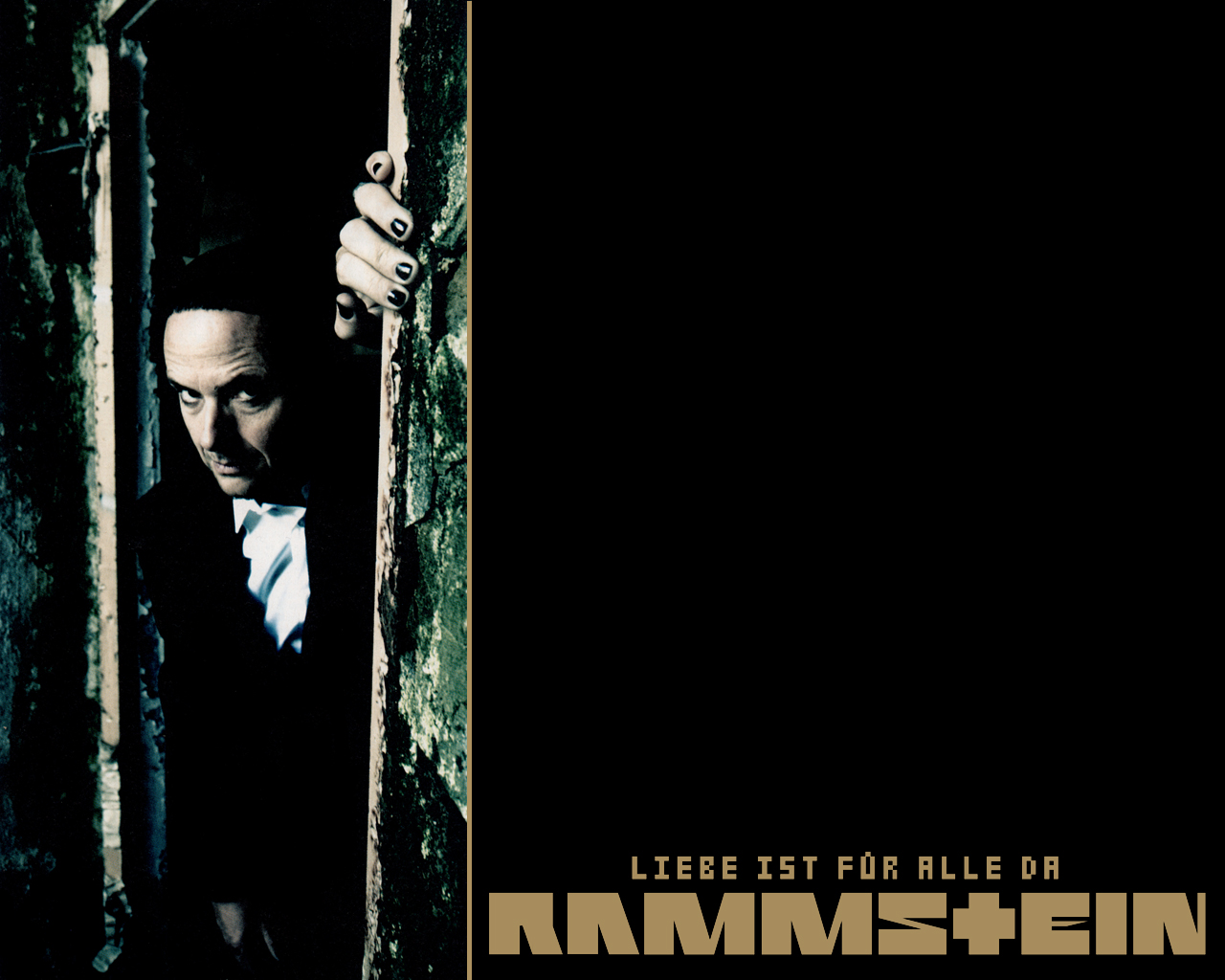Review - Rammstein - Liebe ist für alle da
 Tue, October 27, 2009 at 3:04 AM
Tue, October 27, 2009 at 3:04 AM Ever since I first heard their captivating churn on the fantastic soundtrack to the otherwise abysmal Mortal Kombat Annihilation, Rammstein have been more of a mystical entity to me than a band. An entity capable of consistently producing entire albums that sing to my music tastes better than any other band I have found.
Whether Rammstein defined my musical tastes or whether I simply happened upon the only band on Earth that could practically do no wrong in my eyes is something I may never know. Regardless, their music was vital to my youth and remains equally vital to my being now.
It is easy to forget, however, that anything placed on such high a pedestal has the longest distance to fall.
Any slight change in style, any slight dip in quality and someone as fanatical about the band as myself will be left out in the cold, sad and alone, his precious guide into the musical world having abandoned him and left him with no one to revere, no one to look up to, no one to give him eternal hope in the form of beautiful sound waves.
Rammstein have, until now, produced a scant three new album releases since I have discovered them, and each produced a different wave of feelings for me.
I was lucky enough to have personally experienced the dawn of the album Mutter, their first new release after I discovered them. I have long considered Mutter the pinnacle of their creative abilities - a testament to the power of their scintillating mix of beautiful melodies, churning rhythms, and German poetry.

The wait for Reise, Reise was interminably long and the product it produced decidedly different from their earlier work, but I still absorbed every drop. It was epic on a scope far beyond what had come previously, even if it had abandoned some of the aggression.

Rosenrot saw the biggest change and the smallest period of anticipation, coming just a year after Reise, Reise in a highly unorthodox move by Rammstein. It took a while for the true depth of the changes present on this record to really sink in. To say this album is a divisive force among Rammstein fans is to utter a severe understatement. While I have come to appreciate its differences and the emotional power it displays, I began to worry about the course the album had set for the band. 
The twin albums of Reise, Reise and Rosenrot had become progressively less industrial, less aggressive, and more experimental. So far it had not been enough to shake my faith, but could another move in such a direction finally separate me from my beloved band? Finally create a stylistic divide wide enough to turn me into one of those pathetic souls yearning for the “good old days” and lamenting that my band of choice had the nerve to actually move on and try something different? Would they force me to transform into one of those bile-spewing creatures claiming that the band was incapable of ever matching the utter brilliance of their early masterpieces?
Would I be forced to turn on my beloved Rammstein, forced to admit that they weren’t, in fact, infallible?
Like the otherworldly entity I sometimes like to imagine them to be, it appears that they had simply been testing my faith in their most recent absence.
I never should have doubted them.
After finally getting my hands on the full version of Liebe ist für alle da and soaking it in with a pure, unadulterated joy I haven’t felt in ages, it became clear that perhaps the band had some of the same worries that I did.
They realized that perhaps they had drifted a bit too far away from what the band really was. Rather than continue the process of change simply for the sake of change, they decided to go on a search for what Rammstein truly meant; to find those all-important roots, those basic definitions that state what a band is all about.
The result truly is a defining album. It is a gospel of modern Rammstein. It is a culmination of everything they have yet produced.
It is, quite simply, the best collection of music they have ever put together.

The band has rediscovered that wonderful aggression in a fashion not seen since their formative albums, Herzeleid and Sehnsucht. The unrelenting churn and animalistic screaming of B********, the horror movie in audio form that is Wiener Blut, and the classic industrial churning and chanting of Rammlied are just samples of the glorious head banging fodder that awaits.
They have again delved into truly dark subject matter, with no pretense of the dark humor or levity they bathed such subjects in on recent albums in songs such as Mein Teil, giving us a look at what lurks in the shadows in the definition of “love”. Such outright darkness has, again, not been seen from the German collective since their first two albums. I challenge anyone who listens to Wiener Blut with a full knowledge of what it means to avoid shifting uncomfortably in their seat as they listen to Till’s simply evil welcoming of the listener into the darkness. 
At the same time, the emotion, the epic scale, and the poetry of recent releases is back in full force. Mixed with the aggression and darkness of old, these more recent additions to the Rammstein sound are given an entirely new context. Reminders of Rammstein’s ability to create a beautiful melody are scattered all over the album, even hidden amongst such aggressive cuts as Rammlied and B********.
Joining these, however, are purer examples of melody more well-crafted than anything yet heard from the band. The soaring vocals of the chorus in Ich tu dir weh are simply impossible not to sing along to. The catchy, well-worded chorus of electronic ditty Haifisch will lodge itself in your head, despite being decidedly atypical for Rammstein. Frühling in Paris stands as easily the most fantastic example of a slower tempo tune ever made by the group, challenged perhaps only by Donaukinder, which was sadly relegated to the deluxe edition so far fewer people will have the opportunity to hear the haunting track.
Liebe ist für alle da beautifully pairs old and new for a Rammstein that sounds revitalized, reenergized, and refreshed.

Till’s vocals are far and away the most consistently impressive performance he has yet delivered, ranging from guttural screams to creepy whispers to low-pitched growls to soaring highs, his voice displays a range that is simply unfair for one vocalist to possess. Combined with his continually impressive poetry that makes terrific use of the band’s native German language, Till makes for a truly formidable leading man.
His bandmates don’t fail to impress either. Richard and Paul give us some of their most memorable riffs in years, largely ditching the indistinct droning guitar sound present on much of Reise, Reise and Rosenrot and returning to the forefront of the mix after being somewhat backgrounded on the last two albums.
Perhaps the most impressive improvement is Christoph, whose drums have gone from generic filler (as was the case even on the otherwise classic Mutter) to driving beats that often take center stage. He is finally displaying consistently impressive drumming ability and the change is truly welcomed. When the churning beat is as important to the music as it is with Rammstein, it is truly surprising that solid, varied drum tracks have taken this long to work their way into the mix.

Every track on this album deserves the listener’s attention, which is a truly rare thing in today’s musical landscape.
In the interest of fairness it should be noted that perhaps the album is not perfect. Roter Sand, while wonderfully haunting, doesn’t quite live up to the mid-album slower track perfection of Frühling in Paris. As the deluxe edition of the album demonstrates, Rammstein’s strict adherence to their “eleven tracks per album” mantra also left one or two solid tunes out in the cold, although having too many good songs is a pretty good problem to have. Still, the terrific Donaukinder really should have been stuffed in somewhere. Finally, the misleading first single Pussy does feel a bit out of place, although its catchiness cannot be denied and its placement after the chilling Wiener Blut is a masterful work of pacing, bringing a bit of much-appreciated humor to an otherwise dark album.

I may not truly have been in much danger of legitimately disliking just about anything put out by Rammstein, as they are far too important to me, but the fact that I like the album this much is surprising even to me.
The band has truly found itself again in a way I frankly wasn’t expecting it to and the result is magical.
The only negative to be found here is the fact that there is only one Rammstein and only one Liebe ist für alle da and, for me, that means that a musical experience this amazing likely won’t come around for a long time, if ever again.
Which makes it all the more vital that I seize it while I can and enjoy the hell out of it.
I sincerely urge you to join me.



Reader Comments (3)
Amazing review! I think the same!
Greetings from Uruguay!
Thanks for the compliment! I'm still listening to and loving the album on a very regular basis. My opinion hasn't changed. I'm glad you agree!
Absolutely like their music